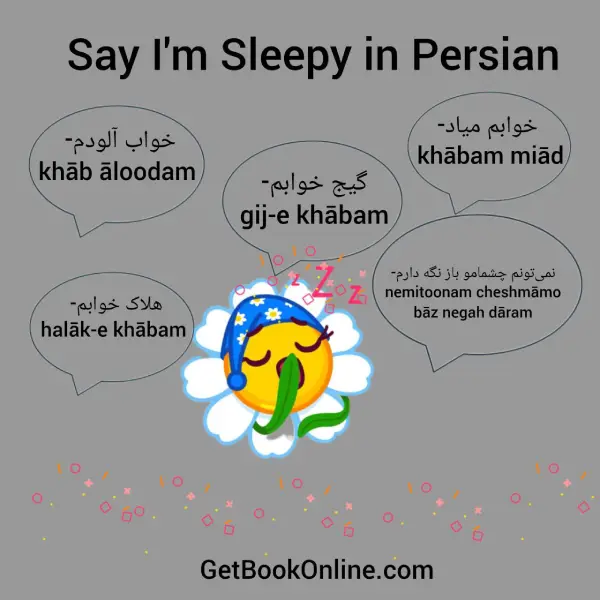Update Date: August 15, 2024

Are heavy eyelids and a longing for a cozy bed signaling that it’s time to express those familiar words, “I’m sleepy in Persian”? Fear not, for in this post, we embark on a journey to equip you with the perfect phrase to convey your drowsiness in the Persian language. Whether you’re navigating a conversation with a friend, communicating with a host, or simply expressing your fatigue, mastering the art of expressing “I’m sleepy in Persian” is a valuable skill to have in your linguistic toolkit.
Throughout this exploration, we’ll delve into the nuances of expressing sleepiness in Persian, offering a range of phrases to suit different contexts and levels of formality. From the straightforward “من خوابم میآید” (man khaabam mi aayad) to the more casual “من خوابم میآید” (man khaabam mi aayad), you’ll discover the perfect way to convey your need for rest with grace and precision.
But our journey doesn’t end there. In addition to learning how to express “I’m sleepy in Persian”, we’ll also explore cultural customs and etiquette surrounding rest and relaxation in Persian-speaking communities. By understanding the cultural context in which these phrases are used, you’ll gain valuable insights into the customs and social norms of Persian culture.
So, dear reader, if you’re ready to master the art of expressing sleepiness in Persian and delve into the rich tapestry of Persian language and culture, then keep reading. Whether you’re a language enthusiast eager to expand your linguistic repertoire or simply in need of a good night’s sleep, our guide is here to help. Let’s embark on this journey together and unlock the secrets of expressing “I’m sleepy in Persian”.
خوابم میاد- khābam miād
“خوابم میاد” is the simplest way to say I’m sleepy in Persian. It is a simple and direct way to express the feeling of drowsiness or fatigue. The phrase consists of two parts: “خوابم” (khābam), which means “sleep” or “sleepy,” and “میاد” (miād), which is a conjugated form of the verb “آمدن” (āmadan), meaning “to come.”
When used in conversation, “خوابم میاد” serves as a straightforward statement of one’s current state of tiredness or desire for sleep. Whether uttered in a casual chat with friends or in a more formal setting, this phrase effectively communicates the need for rest.
In Persian culture, expressing feelings of fatigue or sleepiness is not uncommon, especially in situations where individuals may be experiencing the effects of a long day or a lack of rest. By using the phrase “خوابم میاد,” individuals can convey their need for sleep without the need for lengthy explanations or elaborate expressions.
It’s worth noting that while “خوابم میاد” is a common and widely understood phrase in Persian, there may be variations or alternatives used in different regions or contexts. However, the straightforward nature of this expression makes it a versatile and universally recognized way to communicate feelings of sleepiness in Persian-speaking communities.
Overall, “خوابم میاد” provides a concise and effective means of expressing the sentiment of “I’m sleepy in Persian”, allowing individuals to convey their need for rest with ease and clarity.
گیج خوابم- gij-e khābam
The phrase “گیج خوابم” in Persian translates to “I am impacted by sleep” or “I am feeling dizzy due to sleep.” This expression conveys a state of drowsiness where one feels less conscious or alert due to the effects of sleep deprivation or fatigue.
“I’m sleepy in Persian” captures the essence of feeling drowsy and less attentive, indicating a strong desire or need for rest. When someone says “گیج خوابم,” they are expressing their readiness to surrender to the embrace of sleep, acknowledging the physical and mental effects of exhaustion.
This phrase is commonly used in informal settings among friends or family members to communicate a need for rest or to explain why one may appear lethargic or unfocused. It can also be used humorously to convey a sense of being disoriented or out of sorts due to lack of sleep.
In Persian culture, sleep is highly valued for its restorative and rejuvenating properties, and expressing one’s need for rest is considered both natural and necessary. By using phrases like “گیج خوابم,” individuals acknowledge the importance of prioritizing sleep and self-care for overall well-being.
So, whether you find yourself struggling to keep your eyes open during a late-night study session or feeling groggy after a long day of work, “گیج خوابم” serves as a succinct and relatable way to express the universal experience of feeling sleepy in Persian.
خواب آلودم- khāb āloodam
The Persian phrase “خواب آلودم” translates to “I’m sleepy” in English. It is a succinct and commonly used expression say I’m sleepy in Persian. The word “خواب” means “sleep,” and “آلودم” is derived from the root “آلوده” which means “affected” or “laden.” Therefore, “خواب آلودم” literally means “I am affected by sleep” or “I am laden with sleep.”
This phrase is versatile and can be used in various contexts, from casual conversations with friends and family to more formal settings. Whether you’re expressing your fatigue after a long day of work or signaling your desire for rest before bedtime, “خواب آلودم” effectively communicates your need for sleep in a concise manner.
Additionally, the use of the word “آلودم” adds a poetic touch to the expression, evoking imagery of being enveloped or immersed in the feeling of sleepiness. It conveys a sense of being overtaken by the desire to sleep, emphasizing the physical and mental effects of tiredness.
Overall, “خواب آلودم” is a simple yet evocative phrase that captures the universal experience of feeling sleepy. Whether spoken with a yawn or whispered with a sigh, it serves as a relatable and familiar way to communicate one’s need for rest in Persian language and culture. If someone said خواب آلودم tell him خوب بخوابی which is a phrase to say goodnight in Persian language.
نمیتونم چشمامو باز نگه دارم- nemitoonam cheshmāmo bāz negah dāram
The phrase “نمیتونم چشمامو باز نگه دارم” translates to “I can’t keep my eyes open” in English, and it perfectly captures the sensation of drowsiness or fatigue. This expression is common phrases to express I’m sleepy in Persian and conveys the feeling of being sleepy or struggling to stay awake.
When someone says “نمیتونم چشمامو باز نگه دارم,” they are expressing their physical inability to keep their eyes open due to exhaustion or sleepiness. It’s a straightforward and relatable way to communicate the need for rest or sleep in Persian-speaking communities.
This phrase is often used in informal settings among friends or family members, especially when someone is feeling particularly tired or sleepy. It can also be used humorously to exaggerate one’s level of fatigue, adding a playful tone to the conversation.
In addition to its literal meaning, “نمیتونم چشمامو باز نگه دارم” also carries cultural connotations related to the importance of rest and self-care. In Persian culture, there is a strong emphasis on the value of taking breaks and prioritizing one’s well-being, and this phrase reflects that ethos by acknowledging the need for sleep and relaxation.
Overall, “نمیتونم چشمامو باز نگه دارم” is a versatile and widely used expression to say I’m sleepy in Persian, conveying both a physical sensation and a cultural attitude towards rest and rejuvenation. Whether used casually among friends or more seriously to signal the need for rest, this phrase is an integral part of Persian language and culture.
هلاک خوابم- halāk-e khābam
The phrase “هلاک خوابم” is another way to say I’m sleepy in Persian and carries a deeper connotation of being desperate or crazy about going to bed. It reflects a strong desire for rest and a longing to escape into the embrace of sleep.
The word “هلاک” (halāk) typically means “destruction” or “ruin,” but in this context, it emphasizes the intense feeling of being overwhelmed by sleepiness. It signifies a state of exhaustion where the need for sleep is so intense that it feels like it could consume or overwhelm the individual.
“خوابم” (khābam) means “my sleep” or “sleepiness,” indicating that the speaker is referring specifically to their own need for rest. By combining “هلاک” with “خوابم,” the phrase paints a vivid picture of someone who is at the mercy of their overwhelming desire to sleep.
This expression is commonly used in casual conversations among friends or family members when someone is visibly struggling to keep their eyes open or maintain their alertness. It conveys a sense of empathy and understanding for the person’s fatigue while also light-heartedly acknowledging the universal experience of feeling utterly drained and in need of rest.
Overall, “هلاک خوابم” captures the essence of being overwhelmingly sleepy and desperate to go to bed. It reflects the universal human experience of longing for the comfort and solace of sleep after a long day, making it a relatable and commonly used phrase in Persian language and culture.
میخوام مثل خرس بخوابم- mikhām mesle khers bekhābam
The Persian phrase “میخوام مثل خرس بخوابم” translates to “I want to sleep like a bear.” This whimsical expression vividly depicts the speaker’s desire for deep, uninterrupted rest, drawing inspiration from the hibernation habits of bears.
In Persian culture, comparing oneself to a bear in relation to sleep carries connotations of seeking profound and undisturbed slumber. By invoking the image of a bear, known for its ability to sleep soundly for extended periods, the speaker emphasizes their longing for a similarly restful experience.
“میخوام مثل خرس بخوابم” which is an informal phrase to say I’m sleepy in Persian and can be used in various contexts to express a strong desire for sleep. Whether uttered with a yawn in the morning or whispered with a sigh at the end of a long day, it conveys a universal sentiment of fatigue and the need for replenishing rest.
Furthermore, the comparison to a bear adds a touch of humor and whimsy to the expression, making it a playful way to communicate the intensity of one’s sleepiness. By likening oneself to a bear, the speaker not only emphasizes their need for rest but also injects a lightheartedness into the conversation.
Overall, “میخوام مثل خرس بخوابم” captures the essence of longing for deep sleep in Persian culture, while also infusing the sentiment with a touch of humor and whimsy. It serves as a colorful expression of the universal desire for rest and rejuvenation after a day’s activities.
دیگه نمیتونم بیدار بمونم- dige nemitoonam bidār bemoonam
The Persian phrase “دیگه نمیتونم بیدار بمونم” translates to “I can’t stay awake anymore” in English. This expression conveys a sense of exhaustion and fatigue, indicating that the speaker is no longer able to keep their eyes open and remain alert.
When someone says “دیگه نمیتونم بیدار بمونم,” it typically means that they have reached their limit and are in desperate need of rest. Whether it’s the end of a long day or the middle of a sleepless night, this phrase is a clear indication that the speaker is feeling overwhelmingly tired and struggling to stay awake.
This expression can be used in a variety of contexts, from casual conversations with friends and family to more formal situations where it’s important to communicate one’s need for rest. It’s a straightforward and direct way to convey sleepiness and exhaustion in Persian, allowing the speaker to express their state of fatigue with clarity and precision.
In Persian culture, there is a strong emphasis on the importance of rest and self-care, and expressing one’s need for sleep is seen as a natural and necessary part of life. By using phrases like “دیگه نمیتونم بیدار بمونم,” individuals can communicate their need for rest while also acknowledging the importance of prioritizing their health and well-being.
Overall, “دیگه نمیتونم بیدار بمونم” is a powerful and versatile expression that allows speakers to communicate their exhaustion and need for rest in Persian language with ease and clarity.
Embracing Rest: Mastering “I’m sleepy in Persian” Language
As we conclude our exploration of expressing sleepiness in Persian language, we unveil the nuances and significance of the phrase “I’m sleepy.” From casual conversations to formal settings, mastering this expression is essential for effective communication and self-expression in Persian-speaking communities.
Through our journey, we’ve delved into the various ways to convey sleepiness in Persian, from the straightforward “من خوابم میآید” (man khābam miād) to the more emphatic “دیگه نمیتونم بیدار بمونم” (digeh nemitoonam bidār bemoonam). Each phrase carries its own subtleties and implications, allowing speakers to express their need for rest with clarity and precision.
But our exploration doesn’t end here. If you have questions about the topic or are eager to deepen your understanding of Persian language and culture, we invite you to reach out to us. Our team of experienced instructors is dedicated to providing you with personalized guidance and support as you embark on your journey to master Farsi.
Whether you’re a beginner seeking to navigate the intricacies of Persian communication or a seasoned enthusiast eager to refine your language skills, our online Persian teachers are here to help. With their expertise and unwavering support, you’ll gain the confidence and proficiency to engage fluently in Persian conversations and unlock the boundless possibilities that await you in the world of Farsi.
Contact us to learn more about how you can elevate your language learning experience with personalized instruction and support. Together, let’s continue to explore the beauty and richness of Persian language and culture, one conversation at a time. Stay with us on Instagram.

